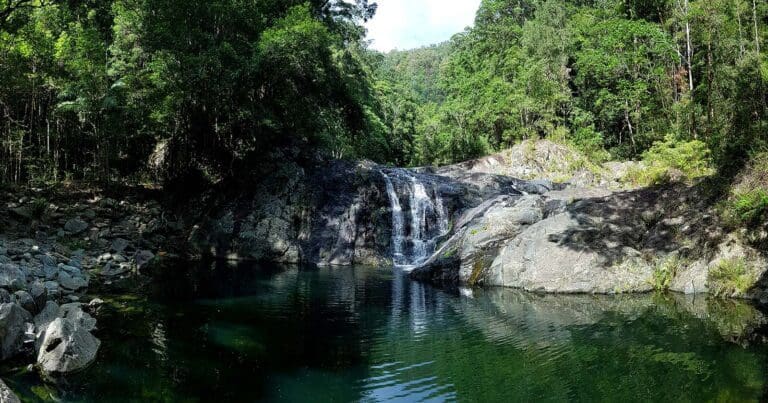Trail Fast Facts
Mount Allan Fire Trail is a 9km, grade 4 return hike in Imbil State Forest, Queensland. This hike typically takes 3 hours to complete.
Hike Overview
The Mount Allan Fire Trail walk follows steep State Forest roads through pine plantation from the Charlie Moreland camping area to Mount Allan. Ride or walk through hoop-pine plantations as you head upwards towards Mount Allan.The final 300m to the destination is for those travelling on foot only, so leave your bike or horse at the hitching rail before walking to see the fire tower. Enjoy scenic views of Mary Valley and the surrounding ranges on your return journey.
This walking track is sometimes closed due to forestry operationsbefore you go, check park alerts for current access, closures and conditions.
Management and logging vehicles use this routeif you hear a vehicle approaching, immediately move off to the side of the trail.
Be courteous and follow the give way code:
1. Cyclists must give way to walkers and horseriders, and alert others when approaching them.
2. Walkers must give way to horses.
Track Grade
Grade 4 (Hard) - Challenging Walks for Experienced Walkers: Grade 4 on the AWTGS signifies challenging walking tracks. Bushwalking experience is recommended for these tracks, which may be long, rough, and very steep. Directional signage may be limited, requiring a good sense of navigation. These walks are suited for experienced walkers who are comfortable with steeper inclines, rougher terrain, and potentially longer distances.
Map and GPX file
Max elevation: 587 m
Min elevation: 142 m
Total climbing: 490 m
Total descent: -490 m
Trailhead
Sorry, no records were found. Please adjust your search criteria and try again.
Sorry, unable to load the Maps API.
Getting there
The Mount Allan Fire Trail is accessed from Charlie Moreland day-use area. From Kenilworth, follow MalenyKenilworth Road for 6.2km and turn right onto Sunday Creek Road and drive another 5km to reach the Charlie Moreland day-use area.
Sunday Creek Road is a gravel road suitable for conventional, two-wheel-drive vehicles, however caution is required during wet weather.
Photo gallery
If you’ve got some great shots from this hike, I’d love to see them! Please upload your .jpg files here to help inspire other hikers and show off the beauty of the trail.
A quick note: Uploading your photos doesn’t mean you lose ownership. You’ll be credited for any photos you share, and you can request to have them removed at any time.
About the region
Nestled in the Sunshine Coast hinterland, Imbil State Forest is a perfect spot for a family getaway. Here you can escape the city for a day, a night or even a week. Walk, hike, swim, mountain bike, horse ride or just relax beside a rainforest creek.
Imbil State Forest is also home to over 120 bird species that occasionally visit the Amamoor State Forest. Check out the Bellbird Feature Protection Area, where visitors will be treated to the delightful song of bellbirds as you walk about or have a picnic. BBQs and picnic tables are already provided here.
Enjoy a picnic under a shady tree or cook up a feast on the barbecue, along the banks of Little Yabba Creek. After lunch relax with a dip in the creek or spend some time exploring the park on Little Yabba or Piccabeen circuits. Along these walks you will discover Imbil's diverse landscape including lush rainforest, open eucalypt forest and hoop and exotic pine plantations that are home to more than 120 species of birds.
Up for a challenge? Then you can take a hike up Mount Allan and be rewarded with spectacular 360 degree views of the Mary Valley and surrounding ranges. Horses and mountain bikes are also welcome on this shared trail.
At night, relax beside a camp fire under a starry sky before falling asleep to the sounds of the Australian bush in the Charlie Moreland camping area, which is a terrific location for camping, fishing, canoeing, and boating. Additionally, you may want to spend a night or two at the Borumba Dam because camping is prohibited within the forest.
The forest and its surroundings also have several fantastic trails that can be explored on a bicycle or on foot. The Fig Tree walk, which is a 780m long circuit, is one of the most popular, but be sure to wear closed shoes because of the stinging nettle. Little Yabba Circuit is 1.5km return, and Piccabeen circuit is 3.5km return.
Suggest an edit
Spotted a change on this trail? Maybe there are new features, the route has shifted, or the trail is permanently closed. Whatever the update, I’d love your input. Your feedback helps fellow hikers stay informed and ensures that our trail info stays fresh and reliable.
Similar trails nearby
Looking for things to do in Imbil State Forest or nearby? Try these similar hikes or bushwalks.
Let someone know
Adventure with Confidence: Register Your Trip Plans
Before you hit the trail, take a moment to fill out our trip intentions form. It’s a simple way to share important details about your hike with family or friends. If things don’t go as planned and you’re not back on time, they can easily notify emergency services, helping to ensure a quick response and reducing worry. Enjoy your outdoor adventure knowing that you’ve taken a smart step for your safety.
Gear to consider
What you carry in your pack will depend on the weather, terrain, time of year, type of adventure, and personal preferences. Having trouble deciding what gear’s right for you? My free planning, food and packing checklists provide an introduction to things your could consider (as well as the Ten Essentials) on your day, overnight and multi-day adventures. Customise your kit according to your personal needs, always considering safety first.
Explore Safe
While planning your hike, it’s important to check official government sources for updated information, temporary closures and trail access requirements. Before hitting the trail, check local weather and bushfire advice for planned burns and bushfire warnings and let someone know before you go. Plan ahead and hike safely.
Weather
Acknowledgement of Country
Trail Hiking Australia acknowledges the Traditional Owners of the lands on which we hike and pay respects to their Elders, past and present, and we acknowledge the First Nations people of other communities who may be here today.






